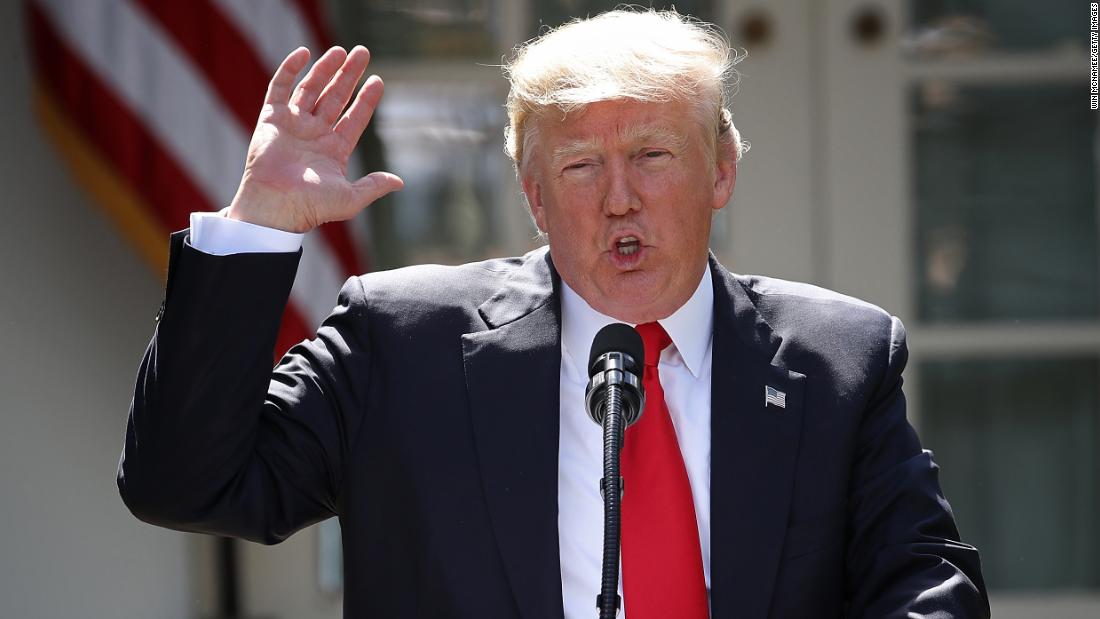
For weeks, the President and his top officials had argued that there is a "crisis" on the southern border. Democrats pushed against that argument, saying there's no security crisis but rather a humanitarian one.
According to federal data, Customs and Border Protection apprehended nearly 400,000 people along the Southwest border in fiscal year 2018, an increase from 2017 but a decrease from 2016. Many of those apprehended were claiming asylum.
Trump on Friday reiterated his claims of an "invasion" of drugs and undocumented immigrants at the southern border, but offered little factual or statistical evidence to back up his claim that a national emergency exists.
Instead, he refuted statistics -- many from his own administration -- that show that border crossings are at record lows, that undocumented immigrants commit crimes at lower rates than native-born Americans and that most drugs coming across the southern border flow through legal ports of entry.
The President announced his national emergency declaration during a rambling performance in the Rose Garden where he bragged about the economy, touted progress in his talks with China, vented about media coverage of his presidency and insisted his negotiations with North Korea are bearing fruit.
"It's been signed many times before. It's been signed by other presidents from 1977 or so. It gave the presidents the power," Trump said. "There's rarely been a problem. They sign it, nobody cares. I guess they weren't very exciting."
But at the same time, the President undercut his case about the existence of a national emergency and the urgency of building new barriers on the US-Mexico border.
"I didn't need to do this," Trump said. "But I'd rather do it much faster."
Democrats and activist groups will almost certainly challenge the declaration in court, as critics pre-emptively argued that Trump cannot use the national emergency to free up taxpayer funds and build the border wall he has long promised his political supporters.
The President declared the national emergency even as he agreed to sign a spending bill from Congress that allocated $1.375 billion for the President to build 55 miles of new fencing. The additional executive actions he is undertaking aim to redirect more than $6 billion in federal funds toward the construction of hundreds more miles of border barriers -- bringing total funding for the wall to nearly $8 billion.
"We don't control our own border," Trump claimed. "We're going to confront the national security crisis on our southern border and we're going to do it -- one way or the other we have to do it."
Repeating claims
Trump repeated claims about "tremendous amounts of drugs" crossing into the US from the southern border -- even though the majority of those drugs come through ports of entry -- and addressed the issue of human trafficking.
He once again reiterated his claim that El Paso, Texas, is safer because of border fencing built there in 2008, despite statistics showing the city had already become safer a decade prior and violent crime rates did not drop as a result of the new barrier.
Trump conceded that he expects his national emergency declaration will be challenged in the courts, but rejected criticism from those who argued he is setting a bad precedent and insisted he is on firm legal ground.
Trump griped about the legal battles to come in a sing-song tone, predicting the matter will eventually come before the Supreme Court.
"We will have a national emergency, and we will then be sued, and they will sue us in the 9th Circuit, even though it shouldn't be there, and we will possibly get a bad ruling, and then we'll get another bad ruling, and then we'll end up in the Supreme Court, and hopefully we'll get a fair shake and we'll win in the Supreme Court," Trump said.
Bipartisan opposition
Democratic and Republican lawmakers have criticized or expressed concern about Trump's plans to move forward with a national emergency.
"Declaring a national emergency would be a lawless act, a gross abuse of the power of the presidency and a desperate attempt to distract from the fact that President Trump broke his core promise to have Mexico pay for his wall," Senate Minority Leader Chuck Schumer of New York and House Speaker Nancy Pelosi of California said in a statement Thursday. "It is yet another demonstration of President Trump's naked contempt for the rule of law. This is not an emergency, and the President's fearmongering doesn't make it one."
Several Republican lawmakers also expressed serious concerns about Trump's move to declare a national emergency, concerned about the precedent Trump's move to bypass Congress might set. But Senate Majority Leader Mitch McConnell, who had previously opposed an emergency declaration, said Thursday he would support the move after Trump agreed to sign the compromise legislation to avert another government shutdown.
Sen. Rand Paul of Kentucky called it a "bad idea."
"I generally don't think it's a good idea," added Sen. Marco Rubio of Florida.
The national emergency declaration still doesn't guarantee Trump's wall. The administration is expected to face a slew of legal challenges, including from House Democrats and landowners whose property will likely have to be seized to mount barriers.
House Democrats could introduce a resolution to rescind the national emergency and eventually vote on it on the House floor. It would then go to the Senate, where they'd have to vote on it within a certain time frame. Even if it were to pass the Republican-controlled Senate, Trump could veto it.
Bagikan Berita Ini














0 Response to "Trump declares border national emergency to bipartisan skepticism"
Post a Comment